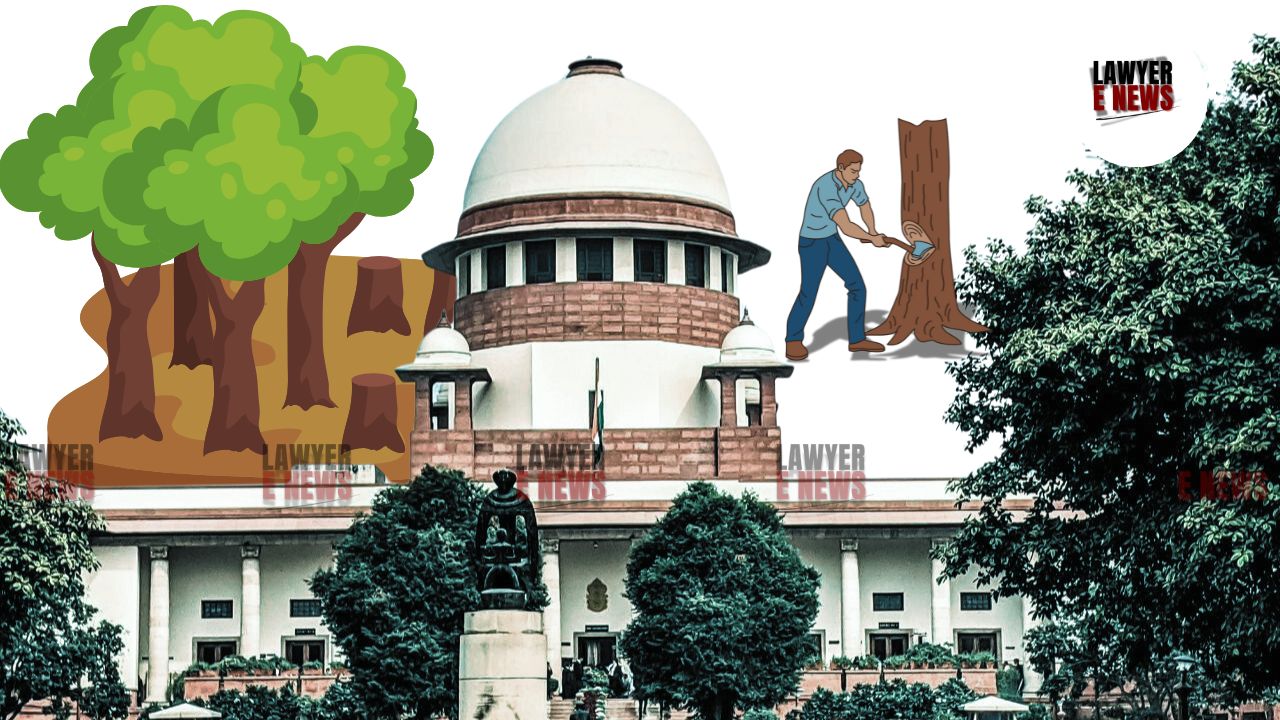-
by Admin
15 February 2026 5:35 AM



Today, In a significant ruling, the Supreme Court has ordered a temporary halt to the felling and transplantation of trees for the Kolkata Metro construction project until the Central Empowered Committee (CEC) under the Ministry of Environment, Forest and Climate Change conducts a thorough review of the issue. The Court emphasized that no trees shall be felled or transplanted without prior permission from the CEC.
A three-judge bench comprising Justices B.R. Gavai, K.V. Viswanathan, and Prashant Kumar Misra delivered this order while hearing a Special Leave Petition (SLP) challenging the Calcutta High Court's decision that allowed the construction of a metro station in Kolkata’s historic Maidan area, which requires the uprooting of around 700 trees near the iconic Victoria Memorial.
Public Interest vs. Environmental Concerns: Kolkata's Underwater Metro Project
The case, titled People United for Better Living in Calcutta (PUBLIC) vs. The State of West Bengal & Ors., was initiated by an environmental group seeking to halt the tree felling and questioning the feasibility of transplanting mature trees as part of the construction. The project, led by Rail Vikas Nigam Limited (RVNL), is critical to Kolkata’s metro expansion, which includes the city’s first underwater metro tunnel—a landmark engineering achievement.
In its June 2024 ruling, the Calcutta High Court had balanced the need for urban development with environmental protection. Chief Justice TS Sivagnanam and Justice Hiranmay Bhattachary acknowledged the ecological concerns but pointed out the unique nature of Kolkata’s metro expansion. They held: “Kolkata is the first city where the underwater metro tunnel has been constructed and successfully put to use. The court has to balance public interest with protecting the ecology.” The High Court also observed that RVNL’s plantation program, aimed at compensating for the loss of green cover, had been approved by the Forest Department.
Petitioner Warns Against Tree Transplantation Risks, Calls for Independent Review
Representing the petitioners, Senior Advocate Jaideep Gupta expressed grave concerns about the impact of transplanting nearly 923 trees, many of which are the tallest and oldest in the Maidan area. Gupta highlighted that while permission for felling had been granted for only 29 trees, the remaining trees were designated for transplantation—a process he described as a “failed concept,” with low survival rates.
"No Trees to be Felled or Transplanted Without Central Empowered Committee's Permission," Rules Supreme Court
"These are some of the oldest trees in Kolkata. The survival rate of transplantation is poor, and we risk losing this green cover forever," Gupta argued, referring to past failed experiments with tree transplantation in other cities like Mumbai. He requested that an independent expert committee review the proposed project and assess the feasibility of transplantation.
Gupta also cited the Supreme Court’s precedent in T.N. Godavaraman Thirumulpad v. Union of India (2006), stressing the need for judicial intervention to protect the environment when urban development projects pose ecological risks.
State and RVNL Defend Project, Argue Transplantation Requires No Additional Permissions
Advocate Saurav Singh, representing RVNL, argued that since the majority of trees were being transplanted, additional permissions were not necessary. He contended that 827 trees were slated for transplantation, while 2,370 saplings would be planted to offset the environmental impact. "This is not felling; this is transplantation," Singh stated, defending the metro project as being in the greater public interest.
Advocate Srisatya Mohanty, representing the State of West Bengal, sought more time to provide instructions, but Justice Gavai expressed disappointment over the delay, noting that "the project is being escalated every day."
Solicitor General Tushar Mehta Defends Metro as "Lifeline of Kolkata"
Solicitor General Tushar Mehta, representing the Union of India, firmly opposed the petitioner’s claims, emphasizing the metro’s critical role in Kolkata’s future development. "This metro project is the lifeline of Kolkata," Mehta asserted, arguing that the petitioners lacked the standing to halt a project of such public importance.
He questioned the petitioner's locus standi (right to bring a lawsuit), adding, "If there is a public interest, the public interest litigant must show a countervailing interest. Here, there is a clear benefit to the public from the construction of this metro line."
Mehta also reassured the Court that transplantation efforts had been successful thus far, with 94 trees already transplanted. He further stated that the transplantation process had been approved by competent authorities, countering the petitioner's claims of procedural lapses.
Supreme Court Orders CEC Review Before Any Further Action
After hearing arguments from both sides, the Supreme Court directed that the Central Empowered Committee (CEC) be entrusted with examining the feasibility and environmental impact of the tree transplantation. Justice Gavai remarked that even if trees were being transplanted, proper permission from the relevant authorities would still be necessary.
"No further felling or transplantation of trees shall take place without the CEC’s express permission," the Court ordered. The CEC has been tasked with reviewing the matter and submitting its findings to the Court before any further action is taken.
Future of Kolkata’s Green Cover in the Balance
The Supreme Court’s intervention marks a pivotal moment for both environmental activists and urban planners. The case has highlighted the challenges of balancing rapid urban development with the preservation of green spaces, especially in historically significant areas like Kolkata’s Maidan.
The decision to pause the felling and transplantation of trees pending further review by the CEC ensures that environmental concerns will be scrutinized before irreversible damage is done. The case will now proceed based on the CEC’s findings, which are expected to shape the future course of action for this vital metro project.
People United for Better Living in Calcutta (PUBLIC) vs. The State of West Bengal & Ors.
